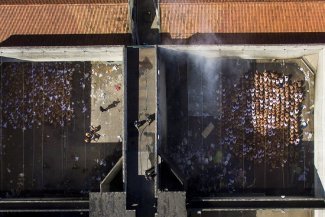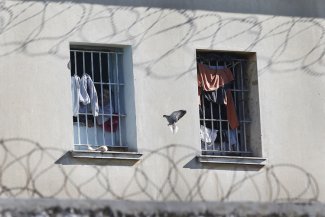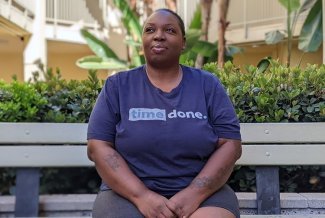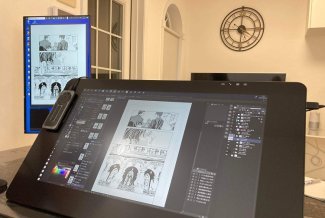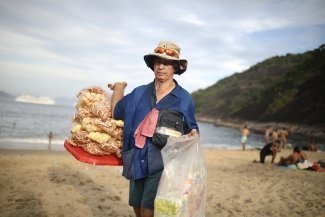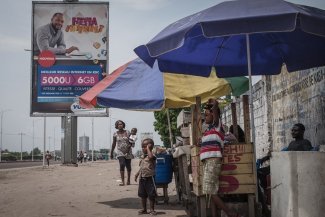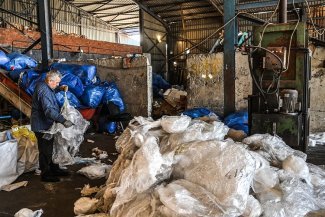The Association for the Protection and Assistance of the Convicted (APAC) offers vocational training to help prisoners reintegrate into society. Samuel (right), pictured here in São João del Rei prison on 26 April 2023, has learned the bakery trade.
Vanessa Dos Passos gets up just before 6am every morning. She has breakfast at 6:15am and starts her day’s work as a caretaker at 7:15am on the dot. The thirty-something spends her day patiently unlocking doors for visitors and writing down their names one by one in her large register, which sits a pink crochet doily. Her shift ends at 7:15pm when the night guard takes over. This may sound like an ordinary job and an ordinary life, but there’s a twist: Vanessa works in the detention centre where she is serving an 18-year prison sentence.
At the Association for the Protection and Assistance of the Convicted (APAC) of São João del Rei in the eastern Brazilian state of Minas Gerais, there are no guards and no weapons. Only a handful of employees take care of administrative duties and assist the inmates in charge of security. This private prison, subsidised to a large extent by public funds, relies heavily on the trust placed in its male and female inmates – imprisoned for drug trafficking, assault, theft, homicide and rape – and prepares them for their reintegration into working life.
“All I knew about life before was that I wanted to commit crimes, I wanted to beat up other people, I wanted to run away,” recalls Dos Passos, who wears a yellow flower print t-shirt. Today, she no longer thinks of running away. “I have the key, they trust me. I could leave, but I won’t. Because here I’m treated with love,” she says, adding:
“I’m here to make amends. If I run away, I’ll be sent back to another prison, and who will suffer? I will. I committed a crime in society and I have to pay for that crime. I’ll walk away with my head held high.”
The concept behind this seemingly utopian approach, developed by a group of Catholics in 1972, is to humanise prisoners. “When prisoners are treated with violence, they respond to society with violence. By humanising them, we give them the opportunity to make a change in their lives,” explains Denio Marx of the APAC International Study Centre. Members of the association employ the term recuperandos, which can be translated as “recoverers” or “people on the road to recovery”.
Recuperandos wear their own clothes, walk freely in their areas, grow and cook their own food, receive their families on Sundays, clean the premises, inspect their own cells and mediate their own conflicts.
The monthly cost for recuperandos is also lower than for other prisoners: 1,390 reals a month (around €260), according to the APAC International Study Centre, compared with 1,819 reals (around €340) for inmates in the traditional system, according to a 2023 study by the National Secretariat for Penal Policies. APAC also has a lower re-offending rate than the traditional system. In the entrance hall of the São João del Rei prison, the statistics are proudly displayed. Around 14 per cent of recuperandos reoffend, compared with almost 40 per cent of those in the traditional system (2020 figures from the National Justice Council). Based on these results, 68 such detention centres have opened throughout the country. The system is even being exported abroad.
A method based on education and religion
The APAC methodology applied in each of these detention centres is based on two pillars: religion and education. Every morning, in the large common room of the closed male section, daily religious services are followed by a variety of courses.
"Why is it important for all of you to read and understand well?” asks Raquel de Oliveira Fragoso, the teacher, interrupting the din at the back of the class. This course on remission through reading, aimed at those who have already completed their primary and secondary education, enables recuperandos to reduce their sentences by reading books. “It improves our writing skills?” one of them asks, without much conviction. “You read texts written by lawyers and judges,” explains the head of the educational programme. “Their vocabulary is not the same as ours. That’s why it’s so important to practise reading and looking for information in a text.” Schooling up to the completion of secondary education is compulsory here, but some recuperandos (51 out of 400) even go on to higher education.
In addition to this theoretical education, there are courses designed to help prisoners find work. Gender stereotypes determine the distribution of activities: cookery, carpentry, bakery, bricklaying, animal husbandry and steelmaking for the men, and hairdressing, eyebrow workshops, cooking and pastry-making for women.
While a cacophony of hairdryers can be heard emanating from the women’s building on this Wednesday evening, on the other side of the courtyard overlooking this hilly region dotted with colonial-era villages, the men are busy preparing dinner.
“My dream is to be a baker,” says Samuel, in his thirties, as he bakes a small loaf of bread. Samuel, who was sentenced to 24 years in prison, didn’t know how to bake bread before arriving here. “APAC has given me the tools to get back into life with a trade and avoid having to do bad things when I get out,” he says.
The situation that recuperandos find themselves in is an exception and a privilege within the Brazilian prison systems. By decision of a judge, the doors of the APAC are only open to those who have shown good behaviour in a previous detention centre. The living environment they experience is a far cry from the violence of Brazilian prisons. A 2022 report commissioned by the Brazilian Ministry of Human Rights condemned insalubrity, overcrowding, unfit food and even acts of torture.
“It’s very cruel. I got sprayed with pepper spray. I saw people receive rotten food and if they gave it back they had nothing to eat. The prisoners take a lot of medication to drug themselves. It’s chaos,” describes Graziela Cristina Marano, who spent just over a year in a normal Brazilian prison. “I’ve seen what human beings are capable of doing to their fellow human beings,” Alisson, a 28-year-old recuperando, says coldly as he glances towards the common system building, located at the top of the adjacent hill. In March 2023, in the north of Brazil, violent attacks on businesses and public buildings, as well as a series of vehicle fires, were ordered from a prison in the state of Rio Grande do Norte in protest of prison conditions.
“It’s hard to imagine anything worse than the Brazilian prison system,” says lawyer Fernanda Prates, who is also a law professor at the Getulio Vargas Foundation, a higher education institute and think tank based in Rio de Janeiro. “The simple fact that people don’t have to go through this in the APACs is wonderful. But this minimum of dignity should be provided by the state, regardless of religious or spiritual paths.”
Indeed, the religious component of the APACs is the subject of much criticism. As Brazil is a secular state, national law guarantees spiritual assistance in detention, as well as freedom of worship. “If the state is the only one with the legitimacy to impose punishment, to impose suffering, to impose deprivation of liberty, it must also be responsible for the way in which this deprivation of liberty is applied,” adds Prates.
Treating crime like a pathology
The other criticism levelled at APACs is based on the perception of crime. “The APACs focus on personal transformation and characterise crime as the result of individual pathologies. This approach fails to take into account the systemic nature and social context of such acts,” says Prates.
“Almost everyone in my family has been arrested,” exclaims an emphatic Vanessa Dos Passos, sitting at her desk in the small entrance hall of the women’s APAC. Her two brothers and her husband are also behind bars. Vanessa grew up in a violent household. “My father was very aggressive, he hit my mother a lot. When I was three, I went to live with my grandmother,” she continues. There are thousands of stories like hers in Brazil’s prison system.
As Prates sees it, the discourse of individual guilt promoted by APAC provides a vision that “legitimises the prison system”. As she argues, many of the prisoners in Brazil’s overcrowded prisons have no place being there. “You can’t think about the prison system without thinking about rehabilitation, what we call the ‘exit door’”.
Prates is particularly critical of the situation faced by prisoners who await trial. The National Council of Justice (CNJ) counts 909,061 prisoners (as of 30 September 2022), 44.5 per cent of whom are in pre-trial detention. The latter make up a minority of APAC recuperandos.
Graziela Cristina Mariano, who has been awaiting trial for two years in São João del Rei for the murder of her violent husband, claims that she acted in self-defence: “He came to kill me,” says the mother of three. Her memories of life before prison or displayed on her Mickey Mouse t-shirt, topped by the inscription: “Mum of João Lucas, aged 3.” “I can be acquitted tomorrow and the time I’ve lost with my children, with my cats, with birthdays, with my mother, with my family, all of this time I’ve spent in prison I will never get back,” she says.




